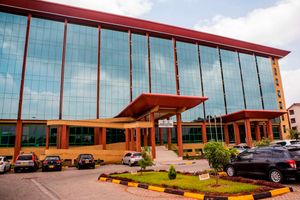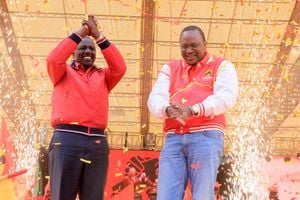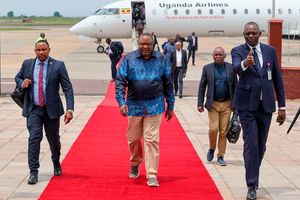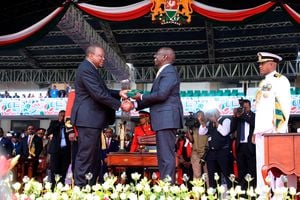
Former President Uhuru Kenyatta.
A standoff has emerged between President William Ruto’s Kenya Kwanza administration and retired president Uhuru Kenyatta over the choice of the retired Head of State’s office as the government moves to fully implement the Presidential Retirement Benefits Act of 2003.
The Act states that a living retired president be given an office and permanent staff, who shall be public officers remunerated on the terms dictated by Salaries and Remuneration Commission (SRC), a retirement package and insurance costs among others after years of dedicated service to the nation.
The government wants Mr Kenyatta, the country’s fourth president, to use an office that was previously occupied by his predecessor Mwai Kibaki before his death in April 2022, in Nairobi’s Nyari estate, Gigiri.
The push by the government is that the Gigiri property has remained vacant following the death of Kibaki, the country’s third president in April 2022.
The government also argues that it will amount to misuse of public funds if another office was sought and rent paid for while the Gigiri office remains unoccupied.
Reliable sources in government, who did not want to be quoted, confided in Sunday Nation that the retired president prefers having his Caledonia residence, just next to state house along the city’s Dennis Pritt road, as his official retirement office.
If the retired president’s wish goes through, it will mean that the government will pay him rent for his own property.
The financing of the statutory benefits for retired presidents and deputy presidents is provided for under the State House Affairs budget line with the State House Comptroller, also the accounting officer of State House budget, as the administrator.
Immediate former Kajiado South MP Katoo ole Metito is the current State House Comptroller.
Mr Metito did not respond to our inquiries.
However, a State House official who did not want to go on record because he is not authorised to do so, said while the retired president wants to be paid rent for his own house, the government is not ready to play ball.
“The government will not use the taxpayers’ money to pay him rent for his own house. That will amount to conflict of interest and therefore an abuse of public funds,” the government official said.
“There is a government property in Nyari near Gigiri that was once used by his predecessor as the retirement office of the president. He should go there or find another facility that is not owned by him,” the official said.
Ms Kanze Dena, the retired president’s private secretary, confirmed that her boss is yet to be allocated an office by the State.
Ms Dena served under Mr Kenyatta as the head of presidential communication unit at State House.
What she did not confirm is whether her boss wanted to turn his private residence into an office but the State declined.
Mr Kenyatta officially retired after handing over the instruments of power to his successor — President William Ruto on September 13, 2022 following his victory in the August 9, 2022 presidential election

The office that was occupied by the late president Mwai Kibaki along Ibis Road, Nyari Estate, Nairobi.
The law requires the State to ensure that a suitable office space, not exceeding 1000 square metres complete with appropriate furniture, furnishings, office machines, equipment and office supplies, to be provided and maintained by the taxpayer, is available to the retired head of state.
The Nyari property, sitting on about an acre parcel of land, was bought at Sh250 million in 2013 after a public outcry over the Sh700 million that National Treasury had set aside to acquire a new office for the country’s third president.
The failure to agree on the office location almost two years after retiring, could be the reason for the low absorption rate of the Sh648.09 million budget allocated to the retired president in the 2023/24- financial year.
A report by the Controller of Budget (CoB) Dr Margaret Nyakang’o on the national government budget implementation review for the first six months of the current financial year, shows that the absorption rate of the retired president’s budget was Sh199.25 million, about 30.7 percent.
Without an office it means that some of the staff members cannot be hired to warrant the required absorption of the budget as allocated.
Of the retired president’s budget the National Assembly appropriated this financial year, Sh120 million is for foreign travel, Sh56 million for domestic travel, Sh51.09 million in basic salaries for permanent employees and Sh49 million hospitality supplies.
There is also Sh29.5 million for personal allowances paid as part of salary, Sh25 million in fuel, oil and lubricants, Sh23 million for insurance costs, Sh18.8 million for “routine maintenance of vehicles and other transport equipment” and Sh17 million for routine maintenance of “other assets.”
Others include Sh6.2 million for communication services, Sh5.75 million for printing, advertising and newspapers, Sh5 million for office furniture and Sh4.5 million for “specialised materials and supplies”.
But even as the standoff over the office location continues, the retired president continues to enjoy his other benefits like the monthly pension, among others.
The law provides for a monthly pension equal to 80 percent of the monthly salary paid to the president the last month before he left office.
Sometimes last year, as relations between the retired president and the new administration deteriorated, politicians allied to the Kenya Kwanza government had threatened to institute a House resolution to block Mr Kenyatta from drawing State retirement perks.
The ruling coalition politicians had accused Mr Kenyatta, who is the chairperson of the council of the Azimio La Umoja One Kenya Coalition party, of engaging in politics which was prohibited for a retired president under the Presidential Retirement Benefits Act.
According to the Act, the National Assembly may by a two-thirds vote resolve that a retired shall not be entitled to the benefits if they “held office in, or actively engaged in the activities of any political party contrary to the provisions of section 6(1).”
Section 6 (1) details the circumstances under which benefits may not be paid. “A retired President shall not hold office in any political party for more than six months after ceasing to hold office as President,” the law states.
However, the president’s allies countered the constitutional provision that protects one’s political rights supersedes the Act of Parliament. The ruling coalition’s politicians have since gone slow on the threat to lobby Parliament to block the retired president’s retirement benefits.
“The pension and other benefits conferred by this Act shall, notwithstanding the provisions of any other law to the contrary, be exempt from tax,” the Act states.
SRC, with a constitutional mandate to review the remunerations and benefits of state and public officers, had reviewed the president’s monthly salary to Sh1.44 million in the July 7, 2017 gazette notice. However, this notice was annulled by the High Court with no appeal lodged, forcing SRC to revert to the March 1, 2013 gazette notice to determine remunerations for state and public officers.
The SRC gazette notice of March 1, 2013 had Sh1,237,500 as the president’s salary at the start of every two of his terms but with a progression rate of Sh103,125 every year.
This means that Sh1,650,000 was the salary of the President by the fifth year of his term in office.
At the disposal of the retired president is an entertainment allowance calculated at the rate of 15 percent of the monthly salary.
It is a requirement of the law that the staff shall be posted on the concurrence of the retired president and shall be responsible only to the retired president.









